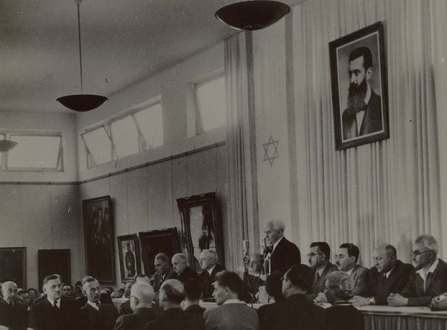David Ben-Gurion
David Ben-Gurion (1886–1973), was a prominent Zionist leader and the first Prime Minister and Minister of Defense of the State of Israel. For decades, Ben-Gurion was involved in the leadership of the Zionist movement, guiding many of its policies and critical decisions. During the British Mandate, he influenced the development of the Jewish yishuv in the Land of Israel, while playing a critical role in the realization of the vision of an independent Jewish State. Ben-Gurion was a major figure in shaping the character of the State of Israel, as well as its security doctrine. He greatly influenced the establishment of the Israel Defense Forces as well as the Israeli education system. He oversaw the absorption of mass immigration and the establishment of the country’s economy. He also contributed to Jewish settlement of the land, the Israeli defense industry, and the strengthening of the status of Jerusalem as the nation's capital.
Born David Green in Płońsk, Russia (now Poland), he received a Jewish religious education as a child. In his teens, he founded the "Ezra" association in his hometown, dedicated to Zionist education and the teaching of Hebrew. He immigrated to the Land of Israel in 1906, and worked in agriculture on various farming settlements. He soon joined the leadership of the Poalei Zion party ("Workers of Zion"). In 1910, Ben-Gurion was appointed to the editorial board of He’ahdut ("Unity"), the party newspaper, and for the first time penned articles under his new name, Ben-Gurion.
In 1912, he travelled to Istanbul to study law, but two years later, while on his way back home during a break from his studies, World War I broke out. In 1915, the Turks expelled him from the country due to his Zionist activities, which prevented him from completing his degree. He sailed with his friend Izhak Ben-Zvi to the United States, where they set up branches of Hehalutz ("The Pioneer") – a Zionist movement which trained young people for immigration to the Land of Israel - while also recruiting Jews to Poalei Zion. On the trip, he met Paula Munweis and the two married. Following the Balfour Declaration in 1917, Ben-Gurion recruited Jews in the United States to volunteer for the Jewish Legion in the British Army. He too volunteered to serve.
Upon his return to the Land of Israel, Ben-Gurion became a well-known figure in the national leadership. He embarked on many missions around the world and read profusely in order to expand his horizons. In 1919, he helped found the Ahdut HaAvodah ("Labor Unity") party, and was elected its leader. In 1920, Ben-Gurion was one of the founders of the Histadrut labor union, known in English as the General Organization of Workers in Israel. He headed it from 1921 to 1935. In 1930, the various workers' parties united to form Mapai (a Hebrew acronym of "Workers’ Party of the Land of Israel"), with Ben-Gurion elected to lead it.
Leader of a State-in-the-Making
In 1935, Ben-Gurion was appointed chairman of the board of the Jewish Agency, and from 1946, he also headed its security department. During his tenure, which continued until 1948, he led the Jewish yishuv and outlined its policies with regard to the “White Paper,” the British Mandate, and tensions with the Arab population. He worked to prepare the military organizations for the War of Independence and oversaw the formation of what would become the Israeli army. He also influenced matters relating to immigration, settlement and general society.




